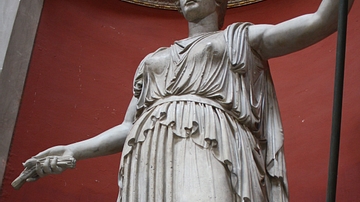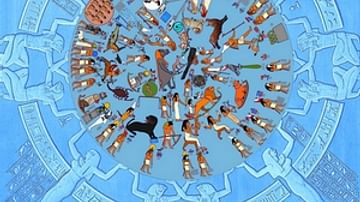Search
Search Results

Definition
Ceres
Ceres is the goddess of agriculture and the harvest in Roman mythology. Her favor would bring humankind plentiful harvests and fruitful crops, but her wrath brought blight, drought, and famine. Usually depicted as a matron, her symbols included...

Definition
Hellenistic Astrology
Hellenistic astrology encompassed various forms of divination in Greece and the Mediterranean, all linked to the observation of astronomical phenomena. Hellenistic astrology was based on the belief that the stars and planets could either...

Definition
Surya
Surya (also known as Aditya) is the Hindu god of the Sun. He is considered the creator of the universe and the source of all life. He is the supreme soul who brings light and warmth to the world. Each day he travels across the sky in his...

Definition
Baalbek
Baalbek is an ancient Phoenician city located in what is now modern-day Lebanon, north of Beirut, in the Beqaa Valley. Inhabited as early as 9000 BCE, Baalbek grew into an important pilgrimage site in the ancient world for the worship of...

Definition
Johannes Hevelius
Johannes Hevelius (1611-1687) was a Polish astronomer based in Danzig (Gdańsk). He worked from his own privately funded observatory, creating maps of the Moon's surface, discovering the first variable star, and spotting several new comets...

Definition
Robert Schumann
Robert Schumann (1810-1856) was a German composer of Romantic music, particularly piano and orchestral works, as well as over 250 songs or lieder. He was also a musical critic and founded his own magazine. His wife Clara Schumann (1819-1896...

Definition
Soma - The Elixir of the Hindu Gods
Soma was a fermented juice drink which was believed to have been consumed by the Hindu gods and their ancient priests, the brahmanas, during rituals. Thought to be an elixir its consumption not only healed illness but also brought great riches...

Definition
Phillis Wheatley
Phillis Wheatley (l. c. 1753-1784) was the first African American woman to publish a book of poetry and become recognized as a poet, overcoming the prevailing understanding of the time that a Black person was incapable of writing, much less...

Definition
Philolaus
Philolaus (l. c. 470 to c. 385 BCE) was a Pythagorean philosopher who claimed that fire was the first cause of existence and heat the underlying source of human life. He is best known for his pyrocentric model of the universe, which replaced...

Definition
Chrocus
Chrocus (Crocus) was a king of the Alemanni who invaded Roman Gaul c. 256 CE until he was defeated by the Roman legions at Arles and then executed. Conversely, he was a king of the Alemanni who served Rome and supported Constantine the Great...